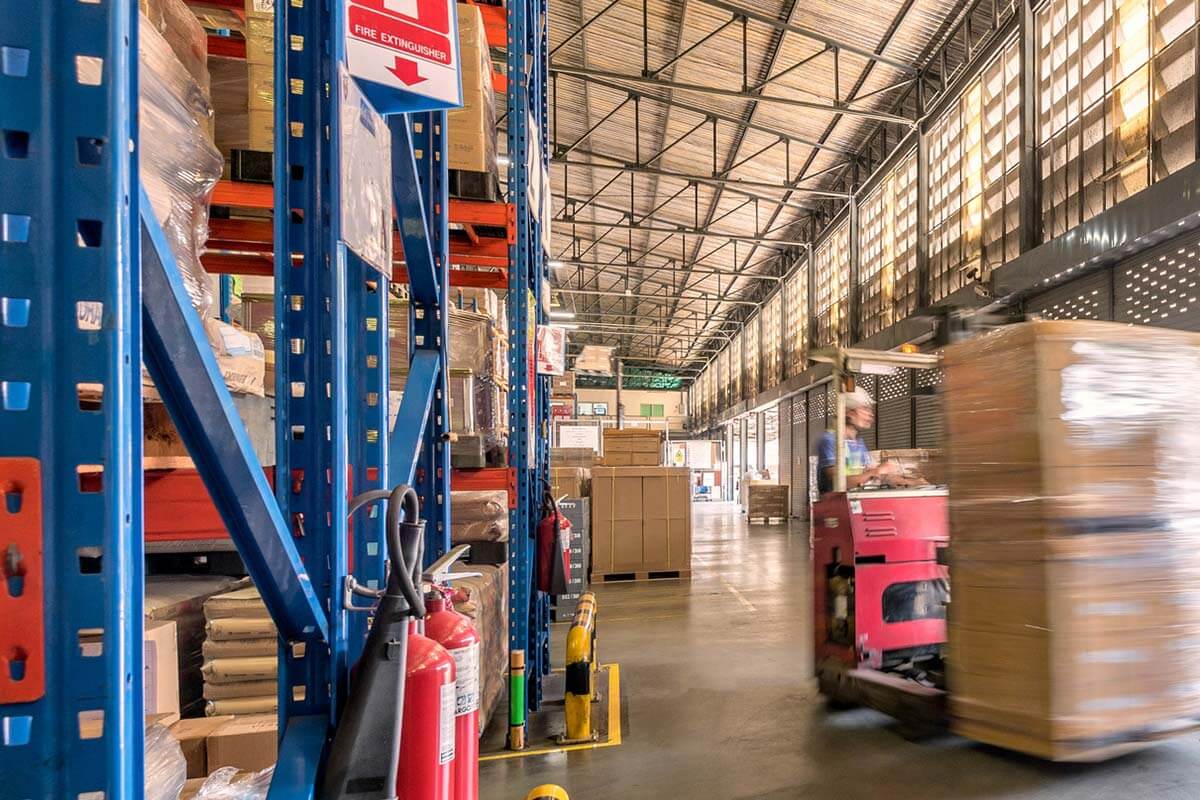10 Types of Storage Warehouses for Your Business Needs

Nothing satisfies you more as a business owner than seeing your business grow. But you know what they say: “More money, more logistics problems.” As your business brings in more customers, the only way you’ll keep them is if you scale your ability to deliver products quickly and in volume. As your business grows, the warehouse you’ve been using that seemed so vast a few months ago looks smaller and smaller every week.
Your business needs a dedicated inventory fulfillment services management plan in place to maintain its momentum. Warehouses are critical to this, but they’ll likely play a different role than what you’ve been used to so far. Learn about their capabilities so you can choose the right ones for the next stage of your business’s growth.
Looking for warehouse management services to grow your business?
Where Do Warehouses Fit Within Logistics and Storage?
Warehouses serve as storage areas for large amounts of inventory that will typically have to wait a month or more to be shipped to customers. While other types of logistics facilities provide more timely service and a wider offering of services, warehouses still occupy a vital role in a growing business’s logistics chain. Quite simply, there are few other places that are safe and clean enough for businesses to store inventory.
With the growing sophistication of the logistics chain overall, warehouses have also diversified into offering different types of services. This process has accelerated as fulfillment centers arose to challenge the traditional dominance of the warehouse as the preferred storage option for inventory. Your business has more options to choose from than ever before, but choose carefully because some warehouses are better suited for your needs than others.
Related: Help! I’m Outgrowing My Warehouse!
Self-storage Warehousing
Self-storage warehousing is growing in popularity, but it has a number of drawbacks that make it ill-suited for businesses when compared to store warehouses. For one, these facilities often lack climate control capabilities, and those that include them typically aren’t calibrated to hold inventory for businesses. They can also be expensive over the long term, especially if you’re renting a larger space to hold large amounts of inventory. Facilities with limited hours can also cause problems if you experience a surge in orders that need to be fulfilled now.
10 Different Types of Warehouses
Storage warehouses are quickly diversifying to meet the growing demand for their services across many industries, especially e-commerce. During 2020’s record year for e-commerce, Black Friday online sales zoomed to $9 billion, representing a 21 percent jump year-over-year. The trend is only set to continue, and yesterday’s sleepy warehouses are quickly adapting to the new reality.
Public Warehouses
Public warehouses are owned by government entities and can be utilized by private-sector companies. They’re highly competitive and are often rented out on a first-come, first-served basis. They play a vital role in supplementing the supply chains of companies due to their flexibility despite their limitations.
Pros
- The public warehouse can be an affordable storage warehousing option, allowing for both personal and business use for a short time.
- It’s easy to rent spaces in multiple locations and you can scale up (or down) your rental space as your needs change.
- With a pay-as-you-go model, you are free from a lengthy contract for space.
Cons
- Public warehouses are often not current with state-of-the-art technology.
- They may also experience surges in seasonal demand, making it difficult to obtain space when you need it most.
- Over time, the pay-as-you-go model can be more expensive than what you would pay for a permanent space, at least in terms of the price per cubic foot.
Private Warehouses
A private warehouse is owned by wholesalers who rent out space on longer-term contracts to a limited number of customers. They typically offer a wider range of services than public warehouses, including greater access to and oversight of your goods. They usually include a more specialized workforce that can do more than basic storage warehousing tasks. Private warehouses may also be owned by a single company that uses it for its own purposes. However, those added benefits come at a cost, which could put them out of reach of some companies.
Pros
- A private warehouse offers exclusive access to a limited number of customers or only your employees, if you own the building.
- They allow for a greater degree of control over operations and more specialized services than a public facility.
- A private warehouse is a good option for e-commerce businesses that need a long-term solution for a strategic location.
Cons
- A private warehouse is a more expensive option at first than a public warehouse and requires a substantial capital investment should you decide to build it yourself.
- If your company owns the warehouse, your logistics chain won’t be as flexible as other companies, should you need to change it.
Bonded Warehouses
Bonded warehouses are used to store, manufacture, or otherwise manipulate dutiable goods prior to their sale. Goods may be stored for import or export duty-free until such a time as they are released to their buyers, at which time the customs fees are paid.
Pros
- Restricted items can be stored securely for up to two years until legal paperwork is completed.
- Their customs fees are not paid until products are purchased.
- This also allows companies to store more of their product closer to foreign consumers.
Cons
- After a period of two years, the goods inside a bonded warehouse must be sold if they haven’t been already, sometimes at a loss to their owner.
- Bonds must be paid to the warehouse authority whenever a space is rented. This ensures no monetary loss is incurred when products are released.
- Bonded warehouses are only available for goods that face duty fees.
Smart Warehouses
Smart warehouses heavily utilize automation to minimize human interaction with products at every stage of the logistics process. They may integrate a wide range of technologies, including robotics, RFID tagging, artificial intelligence, warehouse management systems, and various online tools to make agile, efficient processes.
Pros
- Much of the activity in a smart warehouse is automated and streamlined to eliminate human error while improving efficiency.
- They improve transparency, as you’ll have visibility around the clock into each stage of the logistics process.
- These facilities typically offer greater scalability than human-centric operations
- When a smart warehouse works as intended, you’ll have little need to interact with the few humans who run it.
Cons
- Because it is automated and streamlined, AI sometimes makes mistakes in orders that should require human judgement. These mistakes could damage your reputation and may not be caught until after they have occurred.
- Automated systems are vulnerable to hacking.
- Power outages can take down critical systems, impeding warehouse logistics.
Temperature-Controlled Warehouses
These warehouses are equipped with temperature and humidity control systems to accommodate goods that require specific storage conditions, such as perishable items (e.g., food, pharmaceuticals) or sensitive materials (e.g., electronics). Temperature-controlled warehouses help maintain product quality and extend shelf life.
Pros
- These warehouses help keep products like food and medicine fresh by controlling temperature and humidity.
- They can make perishable items last longer, reducing waste and helping with planning.
- They help businesses reach new customers by safely storing and delivering perishable goods far away.
Cons
- Running these warehouses costs more because of the energy needed for cooling.
- They need special stuff like refrigeration systems and backup power, which can be expensive to buy and maintain.
- If the cooling systems fail, it could ruin all the stored goods.
Bulk Storage Warehouses
Bulk storage warehouses are designed to store large quantities of homogeneous products, such as grains, liquids, or raw materials. They typically feature open floor plans and high ceilings to maximize storage capacity and accommodate specialized equipment for handling bulk goods.
Pros
- Bulk storage warehouses are designed to hold large quantities of goods, making them ideal for businesses that need to store a lot of the same product.
- Due to their efficient design and high storage capacity, bulk storage warehouses can be more cost-effective than other types of warehouses on a per-unit basis.
- With open floor plans and high ceilings, these warehouses maximize storage capacity, allowing businesses to store more goods in a smaller footprint.
Cons
- You need skilled operators to handle the equipment properly.
- Depending on the type of goods stored, spoilage, contamination, or degradation may occur over time.
- Due to their design and layout, bulk storage warehouses may have limited accessibility to individual items or batches of goods. This can pose challenges for inventory management and order fulfillment processes.
Cross-Docking Facilities
Cross-docking facilities enable the direct transfer of goods from inbound to outbound transportation vehicles with minimal storage time. They are commonly used in transportation logistics to expedite the flow of goods and reduce inventory holding costs.
Pros
- Cross-docking allows for a direct transfer of goods from incoming to outgoing vehicles, reducing the need for storage time in between. This speeds up the flow of goods and improves overall efficiency in the supply chain.
- With quicker turnaround times, cross-docking facilities facilitate faster delivery of goods to customers or retail locations, improving customer satisfaction and responsiveness to market demands.
- It's ideal for handling time-sensitive goods or perishable items that require fast delivery to maintain freshness or meet customer demand.
Cons
- Cross-docking heavily relies on efficient transportation networks and coordination between inbound and outbound vehicles. Delays or disruptions in transportation can impact the effectiveness of cross-docking operations.
- Handling goods multiple times during cross-docking increases the risk of damage, loss, or errors in processing.
- It may not be suitable for fragile, high-value, or specialized goods that require careful handling and storage.
Cold Storage Warehouses
Cold storage warehouses specialize in the storage of frozen or refrigerated goods, such as frozen foods, dairy products, and pharmaceuticals. These facilities are equipped with refrigeration systems to maintain low temperatures and preserve product integrity.
Pros
- By controlling temperature and humidity levels, cold storage warehouses help extend the shelf life of perishable goods, reducing waste and allowing businesses to manage inventory more efficiently.
- Cold storage minimizes the risk of spoilage, bacterial growth, and degradation of goods, particularly for perishable items like fruits, vegetables, and meats, leading to lower product losses and higher profitability for businesses.
- Cold storage warehouses cater to a wide range of industries, including food and beverage, pharmaceuticals, biotechnology, and cosmetics, providing essential storage solutions for various temperature-sensitive products.
Cons
- Maintaining low temperatures in cold storage warehouses requires significant energy consumption, resulting in higher operating costs compared to conventional warehouses.
- Cold storage warehouses may have limited shelf space due to the need for insulation and air circulation, which can reduce overall storage capacity compared to non-refrigerated warehouses.
- Any malfunction or breakdown of refrigeration systems or temperature control equipment can compromise the integrity of stored goods, leading to product loss, waste, and potential financial losses for businesses.
Hazmat (Hazardous Materials) Storage Warehouses
Hazmat storage warehouses are specifically designed to safely store and handle hazardous materials, chemicals, or substances that pose risks to health, safety, or the environment. They comply with strict regulations and safety standards to prevent accidents and environmental contamination.
Pros
- Hazmat storage warehouses adhere to strict regulations and safety standards, ensuring the safe handling and storage of hazardous materials, chemicals, or substances, thus minimizing the risk of accidents or environmental contamination.
- By providing specialized storage facilities with appropriate containment measures, hazmat warehouses help mitigate the risks associated with hazardous materials, protecting the health and safety of workers, the public, and the environment.
- Compliance with regulations ensures that businesses avoid fines, penalties, and legal liabilities associated with improper handling or storage of hazardous materials, maintaining regulatory compliance and safeguarding reputation.
Cons
- Building and operating hazmat storage warehouses entail significant costs due to the need for specialized infrastructure, safety equipment, employee training, and compliance with regulatory requirements.
- Compliance with stringent regulations and safety standards for hazardous materials storage adds complexity to operations, requiring extensive documentation, training, and ongoing monitoring to ensure legal compliance.
- Despite safety measures, the storage and handling of hazardous materials always pose some level of environmental risk, including the potential for spills, leaks, or accidents that could result in soil or water contamination if not properly managed.
Distribution Centers
Distribution centers are strategically located facilities used for receiving, storing, and distributing goods to various destinations. They play a crucial role in supply chain management by consolidating products from multiple sources and efficiently routing them to customers or retail locations.
Pros
- Distribution centers help businesses consolidate and manage their inventory in one place, making it easier to keep track of stock levels.
- They make the movement of products smoother by collecting, organizing, and sending them to different places, cutting down on transportation time and costs.
- Many distribution centers offer value-added services such as labeling, packaging, kitting, or assembly, providing additional customization options and enhancing product offerings for customers.
Cons
- Establishing and operating distribution centers requires a significant initial investment in infrastructure, equipment, technology, and personnel, which can be prohibitive for small or medium-sized businesses.
- Managing distribution center operations involves complex logistics, including inventory tracking, order processing, transportation coordination, and warehouse management, which require advanced systems and skilled personnel.
- Distribution centers incur ongoing overhead costs for rent or mortgage, utilities, maintenance, insurance, and labor, which can affect overall profitability and require careful cost management.
What to Look For in Storage Warehousing Services
The key to finding the right storage warehousing provider for your business is knowing what you need. Here are a few questions to ask to guide your search.
- Location: Where is the warehouse located? How close is it to your target market? Is it near major transportation hubs that could help you easily reach other markets in an emergency?
- Scalability: How well can the warehouse scale its services to meet the projected needs of your business? Are they equipped to handle seasonal or sudden spikes in demand?
- Reliability: What kind of record does the warehouse have in protecting its customers’ inventory? What is their policy if your inventory is damaged or delayed from shipping while in their facility?
- Price: How much do the warehouse’s services cost?
Searching for Storage and Warehouse Management Services?
Choosing the right logistics partner for your business isn’t easy. You don’t just need their storage and warehouse management services – you also need to be able to trust them as a fulfillment expert. At Ship My Orders, we place a priority on building relationships that make us a true partner to every business we serve. Let us give your business the treatment it deserves to help you successfully grow to its full potential. Get a free quote today!

-1.png)


